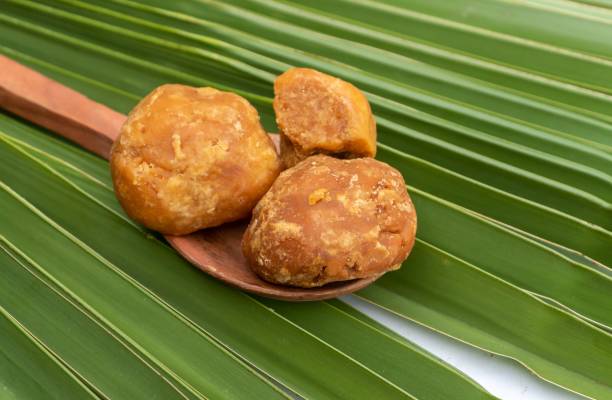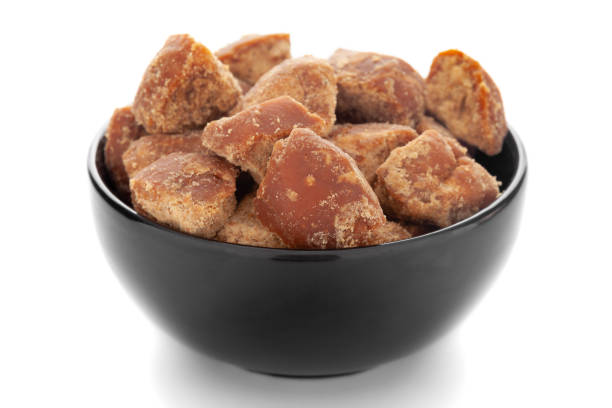Jaggery comes up with so many benefits. Know the incredible health benefits with the blog of Wellhealthorganic.com. Jaggery, a traditional unrefined sugar, is a popular sweetener in many parts of the world, particularly the Indian subcontinent, Southeast Asia, and parts of Africa and Latin America. Made by concentrating sugarcane juice (or sometimes palm sap) without removing the molasses, jaggery has a rich, complex flavor compared to refined white sugar. It can range from golden brown to dark brown in color and comes in various forms, including blocks, granules, and even a liquid variety.
Jaggery not only adds sweetness but also introduces valuable nutrients. Unlike refined sugar, it retains minerals like iron, potassium, and magnesium, and may even contain small amounts of vitamins and antioxidants. While research is ongoing, some believe jaggery may offer health benefits like improved digestion, blood sugar regulation, and a mineral boost.
Beyond its potential health benefits, jaggery plays a significant role in many cultures. It’s a common sweetener in traditional desserts, often used to balance the heat of spicy foods in South India. It’s also used in festivals and ceremonies, and in some parts of India, is even part of engagement traditions.
Jaggery Understanding

Jaggery, sometimes called gur, is a type of unrefined sugar popular in South Asia, Southeast Asia, and other parts of the world. It’s made by concentrating sugarcane juice (or sometimes palm sap) through boiling and evaporation. Unlike table sugar, which goes through a refining process that removes most of the nutrients, jaggery retains trace minerals, vitamins, and some invert sugars.
Here’s a breakdown on understanding jaggery:
- Origin and look: It’s a traditional sweetener, typically golden or dark brown in color, and comes in various forms like blocks, granules, or even powder.
- Production: Unlike refined sugar, jaggery is minimally processed. Sugarcane juice is boiled down until it thickens, concentrating the sweetness.
- Uses: Primarily used as a natural sweetener in desserts, drinks, and some savory dishes. It’s also considered a folk remedy for certain ailments in some cultures.
- Health benefits (claimed): Compared to table sugar, jaggery contains minerals like iron, potassium, and magnesium. Some believe it has a slower energy release and potential health benefits, though more research is needed.
Overall, jaggery offers an alternative to refined sugar with a slightly different taste and potentially more nutrients.
Jaggery: Powerhouse of Vitamins and Minerals
Jaggery: A Natural Sweetener Packed with Benefits
Jaggery, a traditional unrefined sugar made from sugarcane juice, is more than just a tasty treat. It’s a powerhouse of vitamins and minerals, offering a natural sweetness with a boost of health benefits. Unlike refined sugar, jaggery retains essential nutrients during processing, including iron, magnesium, potassium, and vitamins B and C.
This mineral profile makes jaggery a potential aid for digestion, immunity, and even blood pressure regulation. Additionally, jaggery provides a sustained energy source due to its complex carbohydrates, keeping you going for longer compared to the quick rush and crash of refined sugar.
So, next time you’re looking for a sweetener, consider jaggery! It can be a delicious and nutritious addition to your diet.
How It Balances Blood Sugar Levels
The statement “Jaggery balances blood sugar levels” is not entirely accurate. While jaggery is often touted as a healthier alternative to refined sugar due to its mineral content, it can still impact blood sugar levels.
Here’s a breakdown:
- Pros: Jaggery has a slightly lower glycemic index (GI) compared to white sugar, meaning it may cause a slower rise in blood sugar.
- Cons: Jaggery still contains a high amount of sugar. Consuming too much can lead to blood sugar spikes, just like regular sugar.
For diabetics: It’s best to consult a doctor before consuming jaggery. In moderation, it might be okay, but it shouldn’t be a substitute for managing diabetes through medication and proper diet.
Overall: Jaggery can be a more nutritious sweetener than white sugar, but it still affects blood sugar. Consume it in moderation and be aware of its potential impact.
Maintain Digestive Health

Jaggery, a natural sweetener made from sugarcane juice, is traditionally believed to be a digestive aid. Here’s why it might be helpful:
- Stimulates Digestion: Jaggery may help stimulate the production of digestive enzymes, which break down food for better absorption. This can improve overall digestion and prevent issues like bloating and indigestion.
- Minerals for Gut Health: Minerals like potassium and magnesium in jaggery can contribute to a healthy digestive system. Potassium helps regulate muscle contractions in the gut, promoting regular bowel movements.
- Ayurvedic Perspective: In Ayurveda, jaggery’s “ushna” (hot) nature is believed to enhance “Agni” (digestive fire). This improved digestive fire is thought to aid digestion and reduce constipation.
However, it’s important to note that research on jaggery’s digestive benefits is limited. While it might be helpful, especially in moderation, it likely doesn’t contain significant amounts of fiber, a crucial component for gut health.
If you’re considering incorporating jaggery into your diet for digestive health, speak with a healthcare professional first. They can advise you on a suitable amount based on your individual needs.
Ability To Boost Immune System
Jaggery, a natural sweetener derived from sugarcane or palm sap, might be a helpful addition to your diet for a stronger immune system. Here’s how:
- Mineral Powerhouse: Jaggery is rich in minerals like iron, magnesium, and potassium. These minerals are crucial for various immune system functions and overall health. For instance, iron is vital for immune cell production, and magnesium helps regulate the inflammatory response.
- Antioxidant Advantage: Jaggery contains antioxidants that combat free radicals, harmful molecules that can weaken the immune system. By reducing oxidative stress, antioxidants may indirectly support a healthy immune response.
- Digestive Link: A well-functioning digestive system is linked to a strong immune system. Jaggery’s potential prebiotic properties might contribute to digestive health, possibly impacting immunity in that way.
Remember, moderation is key. While jaggery offers potential benefits, it still contains sugar. Consume it in reasonable amounts as part of a balanced diet.
Combatting Respiratory Woes
Jaggery, a natural sweetener, might be a breath of fresh air for your respiratory woes. Unlike refined sugar, jaggery boasts minerals and antioxidants. These are believed to help clear mucus, soothe irritated airways, and even boost immunity. Some folks recommend a small piece daily or with ingredients like onion juice or haritaki (a medicinal herb) for coughs and congestion.
It’s important to note that while jaggery may offer some relief, it’s not a cure-all. For persistent respiratory problems, consult a doctor.
Boots Energy Levels

Jaggery, a natural sweetener, might be a friend to your energy levels. Unlike refined sugar, jaggery is a complex carbohydrate. This means it gets broken down slower by your body, providing a sustained energy boost rather than a quick crash. Additionally, jaggery contains minerals like iron and potassium, which can help combat fatigue.
However, it’s important to note that research on jaggery’s specific impact on energy is ongoing. Moderation is key, as jaggery is still a sugar source.
Heart Health Promotion
Jaggery, a natural sweetener derived from sugarcane, might be your heart’s secret weapon. Packed with potassium, it helps regulate blood pressure and nerve signals to your heart. Magnesium in jaggery may also protect blood vessels. While research is ongoing, jaggery’s antioxidants fight free radicals, potentially lowering heart disease risk. Remember, moderation is key. Enjoy jaggery in small amounts as a healthier substitute for refined sugar to support a heart-happy lifestyle.
Skin Radiance Enhancement
Jaggery: A Secret for Glowing Skin
Jaggery, a natural sweetener, offers a surprising benefit – radiant skin! Packed with natural glycolic acid, it gently exfoliates, removing dead cells for a brighter complexion. This acid also fights wrinkles and fine lines, promoting a youthful appearance.
Jaggery’s magic doesn’t stop there. It helps fade dark spots and blemishes, giving you an even skin tone. Plus, it nourishes the skin, keeping it soft and supple.
Consider incorporating jaggery into your routine. You can consume it in moderation or use it in homemade face masks for a natural and affordable path to glowing skin.
Bones And Teeth Strenghthning
It might be a helpful addition to your bone and teeth health regimen. Here’s why:
- Calcium content: Jaggery contains some calcium, a mineral essential for building strong bones and teeth.
- Mineral mix: It also boasts minerals like phosphorus and magnesium, which work alongside calcium for optimal bone health.
- Combined with milk: Drinking jaggery milk (warm milk with jaggery) is a popular practice believed to boost the calcium content from both sources.
However, it’s important to remember that jaggery’s calcium content is lower compared to dairy products. For a well-rounded approach to bone and teeth health, consider a balanced diet rich in calcium, vitamin D, and other essential minerals, alongside jaggery in moderation.
Relieving Menstrual Discomfort

It is a popular home remedy for menstrual discomfort in some cultures, particularly in India. Here’s why:
- Minerals: Rich in minerals like potassium and sodium, jaggery may help combat fatigue and weakness often experienced during menstruation.
- Anti-inflammatory properties: Jaggery is believed to have anti-inflammatory properties that can potentially reduce cramping.
- Endorphin release: Some claim jaggery can stimulate the release of endorphins, the body’s natural painkillers.
While evidence is mostly anecdotal, many women swear by jaggery for period relief.
However, it’s important to consult a doctor before using jaggery or any other remedy, especially if you have underlying health conditions.
Supports Weight Management
Jaggery can be a helpful addition to a weight management plan, but it’s not a magic bullet. Here’s why:
- Lower Glycemic Index: Compared to refined sugar, jaggery has a slower impact on blood sugar, potentially reducing cravings and keeping you feeling fuller for longer.
- Micronutrients: Jaggery contains small amounts of minerals like iron, potassium, and magnesium, which can contribute to overall health and potentially aid metabolism.
However, jaggery still contains calories. Moderation is key. It can be a better choice than refined sugar, but focus on a balanced diet and exercise for sustainable weight loss.
Versatile In Culinary Field
It is a superstar in the kitchen. Its versatility shines in both sweet and savory dishes.
Jaggery adds a rich, earthy depth to desserts like cakes, puddings, and halwa. It’s a natural alternative to refined sugar, offering subtle caramel notes. One can use jaggery in milk, in evening or morning coffee and many more items. Beyond sweets, jaggery lends a smoky complexity to curries, marinades, and chutneys. Its slight mineral character pairs beautifully with lentils and vegetables. This unique ingredient elevates dishes from simple to sensational.
Sum Up
Jaggery emerges as a more interesting option than refined sugar. While still a sugar, it boasts a richer nutrient profile with vitamins, minerals, and a lower sucrose content. This potentially translates to some health benefits like improved digestion, mineral absorption, and even blood sugar regulation. However, moderation remains key. Further research is needed to solidify some of the health claims, but for those seeking a natural sweetener with a bit more nutritional bang, jaggery offers a compelling alternative.








